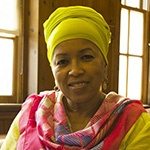Experience as Authority: A Strategic Lens into the World of Women Who Share Their Husbands
Jan. 23, 2017
By Debra Majeed
For the past two years, I have enjoyed the privilege of active engagement with the Shalom Hartman Institute in Jerusalem and the U.S. While my initial impetus for participation centered on expanding knowledge on Judaism as practiced in one of the holiest regions for Muslims and engaging with Jewish women in Jerusalem, I never imagined just how profoundly my participation in the Muslim Leadership Initiative would influence the trajectory of my scholarship and research.
One havruta study (Jewish text study in pairs) and conversations with Marcie Lenk, who, interestingly, directs Christian leadership programs for the Institute, and other Jewish women scholars in 2015 confirmed the significance of the telling and retelling of marriage and family life from the perspective of the women who live it. As a religious historian who is unashamedly and unapologetically Muslim and committed to gender justice, I eagerly shared my personal and intellectual experiences without expecting much commonality. After all, my conversation partners in Jerusalem, and later Boston, were Orthodox women. Who knew Jewish Orthodoxy was replete with such a high and broad level of diversity and complexity!
Soon, I began to experience a level of interconnectedness that was new to me across the faith divide and within academic settings. More specifically, these engagements reinforced commonalities among religious women, particularly Muslims, Mormons and Jews, who choose to challenge and strive to transform patriarchally inscribed norms about female agency, status, rights and mobility from within their faith communities. As Lisa Fishbayn Joffe, director of the HBI Project on Gender, Culture, Religion and the Law, has observed, "Our religious identity affects what we wear, how we educate our children, how we marry and divorce, and how we engage with or avoid the world around us."
The publication of "Polygyny," the first book-length manuscript to explore multiple-wife marriage from the perspective of Muslims of African ancestry, further helped to ground these conversations within the framework of marriage and divorce, and drew me to the Hadassah-Brandeis Institute as a viable space for intellectual wrestling about family law and the lives of women who are regulated by it. In what has become hallowed ground for me, I have come to expect the exchange of ideas, pedagogies, and ways of knowing even as I am led to challenge my own thinking and the sentiments of others who seek to create a nuanced context for thoughtful explorations of women who share their husbands.
It’s no secret that women — Muslim, Mormon, and Jewish, among others — can be disadvantaged by religious and cultural norms. Indeed, when religious women are disparaged and positioned to second-guess their own lived reality, this defilement often translates into what womanist scholar, Delores Williams, describes as "assaults." I read Williams as saying such transgressions can break their spirits, and their ability/commitment to embody the authority inherent in their experiences, in their life choices. As I have written elsewhere, "female experience provides a mechanism for unlocking a way of thinking which ascribes authority and representation only to men, male needs or desires, and male understandings."
Rita Gross extends consideration of the validity of female authority as daily reality when she notes, "women's experience possesses a religious authority of utmost importance, never to be overlooked or denied, never to be sacrificed in order to conform to external or traditional sources of authority."
I have found it useful to frame women's experience as authority especially in explorations of multiple-wife marriage. Doing so not only situates women at the core of discourse on this partnering form, but it also lays the groundwork for religious women — Muslims, Jews, Mormons, among others — to speak expansively, critically, and collaboratively about points of division and potential fronts of unity in their considerations of the moral, legal, and practical questions involved when women live polygyny.
The Jan. 30 panel discussion at the Hadassah-Brandeis Institute — "Is Polygamy Good for Women?" — promises to incorporate an embodiment of these ideas as it challenges abstract and idealized depictions of women who share their husbands. I look forward to contributing and being exposed to diverse conversations. Join us.
 Debra Majeed is professor of religious studies at Beloit College and the author of "Polygyny: What It Means When African American Muslim Women Share Their Husbands" (University Press of Florida, 2015).
Debra Majeed is professor of religious studies at Beloit College and the author of "Polygyny: What It Means When African American Muslim Women Share Their Husbands" (University Press of Florida, 2015).